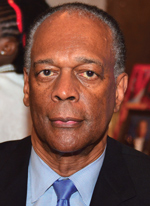By Saeed Shabazz-Staff Writer-

NEW YORK (FinalCall.com) – Bob Law, a nationally syndicated broadcast veteran, for many years could be heard across the nation on his radio “Night Line” talk show.
Some New Yorkers say changes in radio ownership mean informative and influential voices like Mr. Law are a thing of the past and an important vehicle for enlightening and mobilizing the community is dying.
Mr. Law, who is also a longtime community activist and retired from talk radio a decade ago, convened a hearing in Harlem where Blacks voiced their concerns and politicians vowed not to let Black talk radio disappear without a fight.
The hearing concerning threats to Black-owned radio stations in New York City, which has a population of two million Black people, drew participants in cities in New Jersey, like Paterson and Newark.
The three-hour hearing at the Harlem State Office Building on Aug. 13 allowed those concerned to argue why Black talk radio is valuable. “Information is the bloodstream of the Black community, and now there is a sense that this has been taken away,” said Leroy Baylor, who hosts a radio talk show on the City College radio station WHCR 90.3FM called “The Communicators.”
“What really counts is Black ownership,” Mr. Baylor said.
Betty Dopson, co-founder of the Committee to Eliminate Media Offensive to African People, said, “We in New York City don’t know what is happening now, because we don’t have Black talk radio anymore.”
The longtime community activist said New York’s first and only Black mayor, David Dinkins, would have never been elected had it not been for Black radio.
She joined Mr. Law, City Councilman Charles Barron (D-Bklyn) and Michael North in filing a petition with the Federal Communications Commission asking for a delay in approval of the sale of Inner City Broadcasting’s two stations, WBLS-FM and WLIB-AM to a Los Angeles-based holding company, YMF partners.
WBLS hit the NYC airways in 1971 as the only Black owned FM station in city history. It quickly rose to become the city’s leading station.
Inner City Broadcasting, which is best known as “ICBC” fell into bankruptcy in 2011, when billionaire Ron Burkle and other creditors asked a New York bankruptcy judge to place ICBC assets in Chapter 11 to satisfy a $254 million debt owed to the Yucalpa Corporate Initiative Fund LP, Drawbridge Special Opportunities Fund LLP and Fortress Credit Funding LP.
ICBC was the second-largest broadcasting company targeting a Black audience after the Lanham, Md.-based Radio One Corporation. ICBC was founded by the late civil rights attorney and political power broker. Percy Sutton. ICBC at one-time owned 18 radio stations across the nation and the famed Apollo Theater in Harlem.
Mr. Law has charged publicly that ICBC fell victim to “predator lenders” and an Arbitron rating system that undercounts Black listeners and controls advertising revenue.
Sherri Culpepper, 52, said Black talk radio was her life. “We as a people don’t listen to Black radio as others do–it is not just entertainment for us,” she said.
“As an educational leader, I work to teach our youth the value of Black radio, it has produced a valuable outlet,” testified E. Nicole Bailey, principal of the Queens, N.Y.-based Learning Tree Multi-Cultural School. “Good works that minority institutions do not get noticed by main stream media, because we do not have a voice at their table,” she added.
Bilal Hakeem, of the POWER Coalition out of Patterson, N.J., said, “I grew up on Black radio–listening to Bob Law at night. He was able to sharpen my focus. Information is intelligence, it’s about power.”
Camille Yarborough, musician, actress, poet, television producer and activist, said, “It is quite a story we are telling here today.”
Ms. Yarborough stated keeping Black people in their place includes “taking their support systems away.”
“When Bob Law was on from midnight to 5 a.m., we became strong and told our story. He was talking about ‘Respect Yourself.’ Our story is an intellectual compass, a spiritual compass, the biggest story never told is ours,” Ms. Yarborough said.
“We are not going to be able to progress without Black radio, and we need to have the right people serving on the FCC to protect our interests,” said Congressman Edolphus Towns, a Democrat who represents New York.
The veteran lawmaker serves on the Communications, Technology and Internet Committee in the House. The committee oversees FCC operations.
There are five members on the commission charged with “ensuring that the media marketplace remains vibrant, robust and competitive.” Mignon Clyburn from South Carolina is the lone Black member. Ms. Clyburn was appointed by President Barack Obama in 2009.
Mr. Law argued the FCC was not serving Black interests and had allowed media ownership to become concentrated in the hands of a small group of mega-corporations.
“The FCC needs to hear from Black Americans, that is why we are holding this forum. Your testimony is being recorded by a stenographer and we will be sending it to Washington, D.C.,” Mr. Law said.
“We have proven here tonight that the Black community in NYC is engaged, and ready to take the FCC on to preserve our right to have radio programming that is owned by Blacks,” he told The Final Call.
Related news:
Will ‘perfect storm’ of problems doom Black radio? (FCN, 05-29-2009)
Partnership Between The Black Church and The Black Press (Minister Farrakhan/FCN, 05-29-2009)
HR 848 and Black Talk Radio (CedricMuhammad.com, 05-21-2009)












